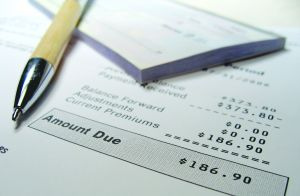Financial Confidence When Facing Divorce
The emotional upheaval of a divorce is no time to be learning money basics and selecting professional advisors. Preparing now isn’t cynical – it’s smart.
In the late 16th century, when death parted married couples far more often than divorce, Sir Francis Bacon wrote, “Knowledge is power.” Women of the 21st century should adopt that credo with the addition of the word “financial.”
With the combination of later marriage, divorce, widowhood and longevity, almost 90 percent of women will end up managing their finances alone at some point in their lives, according to the Department of Labor. A strong base of financial knowledge can prepare you for that responsibility, regardless of when it comes.
 Unfortunately, when a divorce happens, there’s little value in the hindsight knowledge that a bit more focus on the family finances would have been beneficial. Because trouble usually brews long before the papers are served, that first pinprick of doubt is the time to sit up and pay attention. Arm yourself with financial knowledge. If that pinprick goes away and you remain happily married, you’re no worse off for having a better understanding of your overall financial situation. In addition to knowing, at minimum, how much money comes into the household and what specifically goes toward bills, college funds, retirement accounts, savings etc., both monthly and annually, you should also know where key financial documents, such as wills and insurance policies, are kept.
Unfortunately, when a divorce happens, there’s little value in the hindsight knowledge that a bit more focus on the family finances would have been beneficial. Because trouble usually brews long before the papers are served, that first pinprick of doubt is the time to sit up and pay attention. Arm yourself with financial knowledge. If that pinprick goes away and you remain happily married, you’re no worse off for having a better understanding of your overall financial situation. In addition to knowing, at minimum, how much money comes into the household and what specifically goes toward bills, college funds, retirement accounts, savings etc., both monthly and annually, you should also know where key financial documents, such as wills and insurance policies, are kept.
Get to know the family financial advisor, accountant, attorney and insurance professional. If divorce happens, you may decide to form new professional relationships and you will want to hire a certified divorce financial analyst, CDFA ™. If you hold joint accounts or seek joint services – for example, the accountant prepares a joint tax return – you and your spouse are both technically clients, and ethics prohibit professionals from acting against your best interest. Don’t rely on your pending ex to relay information – call these professionals yourself.
Married women may choose to have their own team of trusted advisors – you and your husband can meet jointly with both advisors to keep your overall strategies in sync. Better in a divorce situation not to have to shop around for credible professional help. If you do have to find new professionals, start with referrals from people you trust, particularly those who have been through a divorce. If you at any time become uncomfortable with the professional – particularly if you feel pressured to make major decisions in a short amount of time or invest money in ways you’re not sure about – remember that you hired the professional – and you can fire that professional, too.
If learning the basics of finances and money management seems overwhelming, start with small but consistent steps. Resolve to read something – websites, magazines, books – on a financial topic every day. Check out local seminars or workshops on finances for women, basic financial classes available from your local investment company, bank or community college. Your professional advisors can help as well. Don’t be intimidated. Most professionals welcome the opportunity to share their knowledge and educate clients.
Because a divorce comes with a timeframe, major decisions will need to be made in a relatively short period. These will include splitting assets such as your home, cash and investments, including retirement accounts, as well as liabilities, including your mortgage, vehicle loans and joint credit card debt. Some basic immediate steps include:
- Pulling your credit report.
- Opening individual bank, credit card and brokerage accounts.
- Changing beneficiaries on your accounts and policies. (Check with your attorney before doing this).
- If you are a dependent on your husband’s insurance, determining if and how long your coverage will continue. (Hint: Call the HR department of his employer or the insurance carrier yourself.)
A solid understanding of financial basics and the household’s financial picture, along with a team of trusted advisors, starting with a CDFA, can give you the confidence you need to make financial decisions throughout your life, whether single, married with or without children, divorced or widowed. You owe it to yourself to learn basic money management skills and find the professional assistance you need to make sound financial decisions. It’s a skill you will almost certainly need in your lifetime, so it’s never too early to start.
______________________________________________________________
Karen helps attorneys; mediators, individuals and couples, navigate through the financial morass of divorce and widowhood. Her expertise lies in understanding the special tax and financial issues that can plague divorce and she helps clients get their financial fair share and equitable settlements. She provides financial analysis, projections and solutions so clients can avoid long-term regret over decisions made early on in divorce and widowhood. Karen offers a range of financial, investment and insurance services that address clients’ complete financial picture and long-term needs before, during and after marriage. She is currently writing a book entitled, “To Have and To Hold Onto Your Financial Fair Share: Financial Decision Making When Marriage Ends in Divorce or Death.”
One Response to Financial Confidence When Facing Divorce
You must be logged in to post a comment Login











Pingback: google